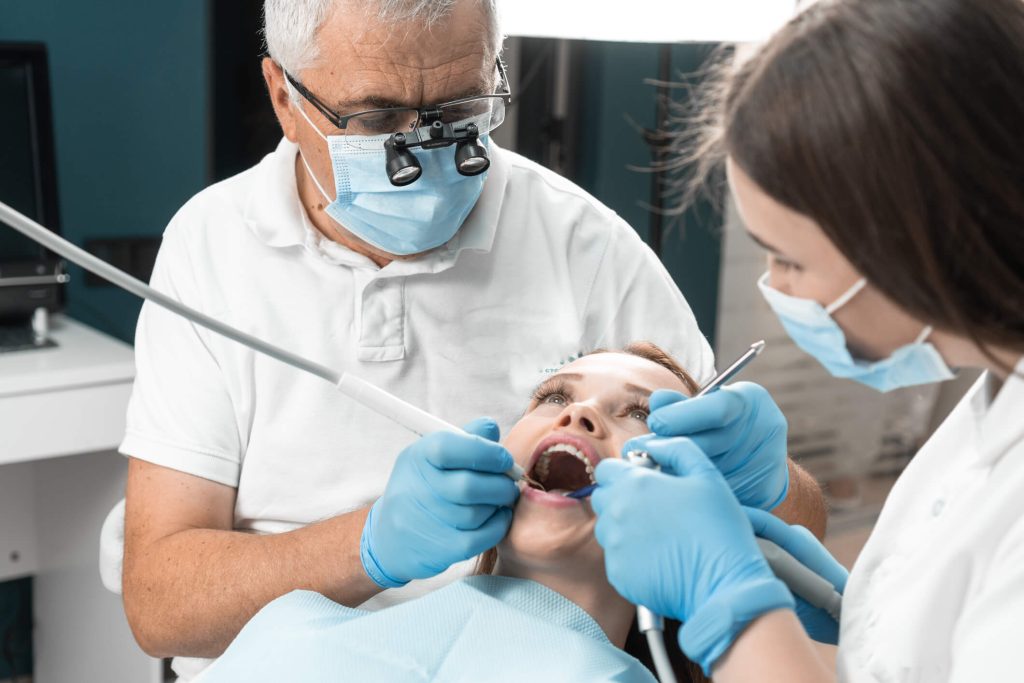In today’s digital age, having a merchant account is essential for businesses to accept credit card payments from their customers. However, not all merchant accounts are created equal, and certain industries are considered higher risk than others.
In this article, we will explore whether dentistry business merchant accounts are high risk or low risk. We will delve into the importance of merchant accounts in the dentistry business, factors determining the risk level, high risk vs. low risk dentistry business merchant accounts, obtaining a merchant account for a dentistry business, and address frequently asked questions about dentistry business merchant accounts.
Understanding Merchant Accounts in the Dentistry Business
To understand whether dentistry business merchant accounts are high risk or low risk, it is crucial to first grasp the concept of a merchant account and its significance in the dentistry industry.
What is a Merchant Account?
A merchant account is a type of bank account that allows businesses to accept credit card payments from their customers. It acts as an intermediary between the business, the customer, and the payment processor. When a customer makes a payment using a credit card, the funds are first deposited into the merchant account before being transferred to the business’s regular bank account.
Merchant accounts are essential for businesses in the dentistry industry as they enable them to offer convenient payment options to their patients. With the majority of people relying on credit cards for their transactions, having a merchant account ensures that dental practices do not miss out on potential revenue.
The Importance of Merchant Accounts in the Dentistry Business
Merchant accounts play a crucial role in the dentistry business for several reasons. Firstly, they provide a secure and efficient way for dental practices to accept payments. By accepting credit card payments, dental practices can reduce the risk of handling cash and minimize the chances of errors or theft.
Secondly, merchant accounts offer convenience to patients. Many patients prefer to pay for dental services using their credit cards as it allows them to manage their expenses and earn rewards or cashback. By offering credit card payments, dental practices can attract more patients and enhance their overall customer experience.
Lastly, merchant accounts enable dental practices to streamline their financial operations. With a merchant account, dental practices can easily track and reconcile their transactions, generate reports, and manage their cash flow effectively. This level of financial visibility is crucial for the success and growth of any business, including dentistry practices.
Factors Determining the Risk Level of Dentistry Business Merchant Accounts

Now that we understand the importance of merchant accounts in the dentistry business, let’s explore the factors that determine whether dentistry business merchant accounts are high risk or low risk.
Industry Regulations and Compliance
One of the key factors that determine the risk level of dentistry business merchant accounts is the industry’s regulations and compliance requirements. The dentistry industry is highly regulated to ensure patient safety and privacy. Dental practices must adhere to strict guidelines set by regulatory bodies such as the Health Insurance Portability and Accountability Act (HIPAA) and the American Dental Association (ADA).
Complying with these regulations can be challenging for dental practices, especially when it comes to handling sensitive patient information and maintaining data security. Failure to comply with these regulations can result in severe penalties and legal consequences. As a result, merchant account providers may consider dentistry business merchant accounts to be higher risk due to the potential compliance issues involved.
Chargeback and Fraud Rates
Another factor that determines the risk level of dentistry business merchant accounts is the chargeback and fraud rates associated with the industry. Chargebacks occur when a customer disputes a credit card transaction and requests a refund from their bank. High chargeback rates can indicate potential issues with the quality of service provided by the dental practice or fraudulent activities.
Fraud rates, on the other hand, refer to the likelihood of fraudulent transactions occurring within the dentistry industry. Fraudulent activities can include identity theft, stolen credit card information, or unauthorized use of credit cards. High chargeback and fraud rates can raise red flags for merchant account providers, leading them to categorize dentistry business merchant accounts as higher risk.
Average Transaction Value and Volume
The average transaction value and volume of a dentistry business can also impact the risk level of its merchant account. Higher transaction values and volumes can increase the potential financial risk for both the dental practice and the merchant account provider.
For example, dental practices that offer expensive cosmetic procedures or specialized treatments may have higher transaction values compared to practices that primarily provide routine dental care. Similarly, dental practices with a large patient base and high transaction volumes may be considered higher risk due to the increased likelihood of chargebacks or fraudulent activities.
High Risk vs. Low Risk Dentistry Business Merchant Accounts
Based on the factors discussed above, dentistry business merchant accounts can be categorized as either high risk or low risk. Let’s explore the characteristics of each category.
High Risk Dentistry Business Merchant Accounts
High risk dentistry business merchant accounts are those that exhibit one or more of the following characteristics:
- High chargeback rates: Dental practices with a history of frequent chargebacks are considered higher risk as they indicate potential issues with customer satisfaction or service quality.
- High fraud rates: Dental practices that have experienced a significant number of fraudulent transactions are categorized as higher risk. This can be due to various factors, including inadequate security measures or vulnerabilities in the payment processing system.
- Non-compliance with industry regulations: Dental practices that fail to comply with industry regulations, such as HIPAA or ADA guidelines, are considered higher risk. Non-compliance can result in legal consequences and reputational damage.
- High average transaction value and volume: Dental practices that have high transaction values and volumes are often classified as higher risk due to the increased financial exposure for both the practice and the merchant account provider.
Low Risk Dentistry Business Merchant Accounts
On the other hand, low risk dentistry business merchant accounts are those that exhibit the following characteristics:
- Low chargeback rates: Dental practices with a history of minimal chargebacks are considered lower risk as they indicate satisfied customers and a lower likelihood of disputes.
- Low fraud rates: Dental practices that have experienced minimal fraudulent transactions are categorized as lower risk. This indicates that the practice has implemented effective security measures to protect customer data and prevent unauthorized transactions.
- Compliance with industry regulations: Dental practices that strictly adhere to industry regulations, such as HIPAA and ADA guidelines, are considered lower risk. Compliance demonstrates a commitment to patient safety and privacy.
- Low average transaction value and volume: Dental practices with lower transaction values and volumes are often classified as lower risk due to the reduced financial exposure for both the practice and the merchant account provider.
Obtaining a Merchant Account for a Dentistry Business
Now that we have discussed the risk levels of dentistry business merchant accounts, let’s explore the process of obtaining a merchant account for a dentistry business.
Finding the Right Payment Processor
The first step in obtaining a merchant account for a dentistry business is to find the right payment processor. Payment processors act as intermediaries between the dental practice and the merchant account provider. They facilitate the processing of credit card transactions and ensure the secure transfer of funds.
When selecting a payment processor, dental practices should consider factors such as reputation, pricing, customer support, and the ability to cater to the specific needs of the dentistry industry. It is essential to choose a payment processor that understands the unique requirements and challenges faced by dental practices.
Preparing the Necessary Documentation
Once a dental practice has chosen a payment processor, the next step is to prepare the necessary documentation required to open a merchant account. The specific documentation may vary depending on the payment processor and the merchant account provider. However, common documents typically include:
- Business registration documents: Dental practices need to provide proof of their legal existence, such as business registration certificates or licenses.
- Financial statements: Dental practices may be required to submit financial statements, including balance sheets, income statements, and cash flow statements. These documents help assess the financial stability of the practice.
- Identification documents: The practice owner or authorized signatories may need to provide identification documents, such as passports or driver’s licenses, to verify their identity.
- Processing history: If the dental practice has previously accepted credit card payments, they may need to provide processing history to demonstrate their transaction volume and chargeback rates.
Negotiating Terms and Fees
Once the necessary documentation is prepared, dental practices can begin the process of negotiating the terms and fees associated with their merchant account. It is crucial to carefully review the terms and conditions, including any potential hidden fees or restrictions.
Dental practices should consider factors such as transaction fees, monthly fees, chargeback fees, and contract terms when negotiating with the merchant account provider. It is advisable to compare multiple offers from different providers to ensure the best possible terms and pricing.
Frequently Asked Questions

Q.1: Are dentistry business merchant accounts considered high risk or low risk?
The risk level of dentistry business merchant accounts can vary depending on factors such as chargeback rates, fraud rates, compliance with industry regulations, and transaction values and volumes. Some dentistry business merchant accounts may be classified as high risk, while others may be considered low risk.
Q.2: Why are dentistry business merchant accounts considered high risk?
Dentistry business merchant accounts may be considered high risk due to factors such as high chargeback rates, high fraud rates, non-compliance with industry regulations, and high transaction values and volumes. These factors increase the potential financial risk for both the dental practice and the merchant account provider.
Q.3: How can dental practices reduce the risk level of their merchant accounts?
Dental practices can reduce the risk level of their merchant accounts by implementing measures to minimize chargebacks and fraud, ensuring compliance with industry regulations, and maintaining reasonable transaction values and volumes. This can be achieved through effective customer service, robust security measures, and regular monitoring of transactions.
Q.4: Can dental practices with high risk merchant accounts switch to low risk merchant accounts?
Yes, dental practices with high risk merchant accounts can work towards reducing their risk level and potentially switch to low risk merchant accounts. This can be achieved by implementing measures to reduce chargebacks and fraud, improving compliance with industry regulations, and maintaining reasonable transaction values and volumes.
Q.5: What are the benefits of having a merchant account for a dentistry business?
Having a merchant account offers several benefits for dental practices, including the ability to accept credit card payments, enhanced customer convenience, improved financial visibility, and streamlined financial operations. Merchant accounts also provide a secure and efficient way to handle payments, reducing the risk of errors or theft associated with cash transactions.
Conclusion
In conclusion, dentistry business merchant accounts can be categorized as high risk or low risk based on factors such as chargeback rates, fraud rates, compliance with industry regulations, and transaction values and volumes. While some dentistry business merchant accounts may be considered high risk due to these factors, others may be classified as low risk. Obtaining a merchant account for a dentistry business involves finding the right payment processor, preparing the necessary documentation, and negotiating terms and fees.
By understanding the risk level of their merchant accounts and taking appropriate measures, dental practices can ensure secure and efficient payment processing, ultimately benefiting their business and their patients.
